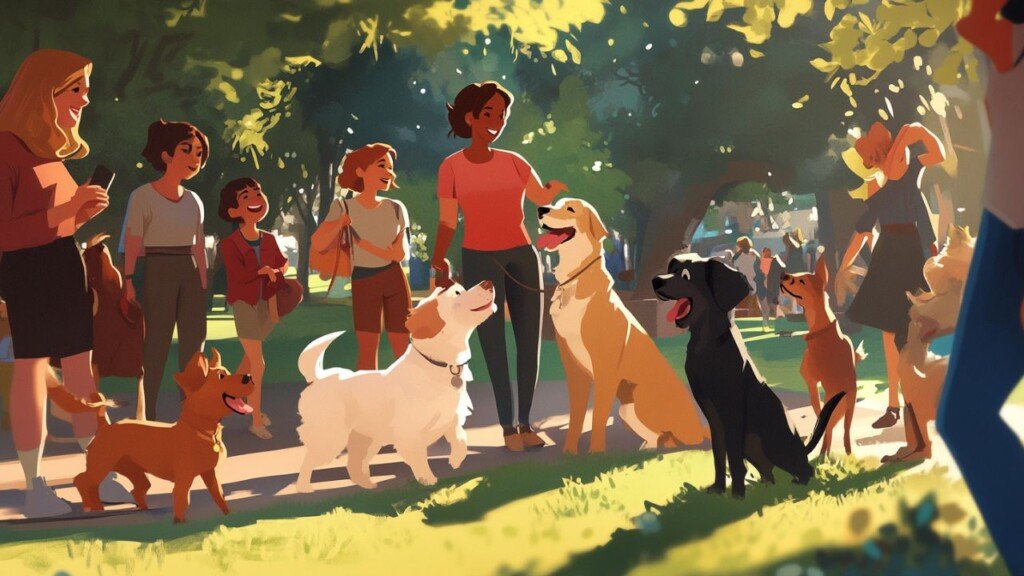Have you ever wondered why certain people seem drawn to specific dog breeds?
It turns out, there might be more to it than just personal preference or lifestyle compatibility.
Recent studies have uncovered fascinating connections between dog breeds and human personalities.
Let’s explore this intriguing relationship and what it might reveal about ourselves and our canine companions.
The Science Behind the Connection
Before diving into specific breed-personality matches, it’s important to understand the research behind these findings.
Studies and Surveys
Several studies have been conducted, surveying thousands of dog owners about their personalities and their chosen breeds.
Researchers have used established personality models, such as the Big Five traits, to categorize human personalities.
Genetic Influences
Some scientists suggest that the connection might have genetic roots, with certain personality traits being linked to preferences for specific physical or behavioral traits in dogs.
This could explain why some people feel an instant connection with particular breeds.

Matching Breeds to Personalities
While individual dogs can vary greatly, certain breed characteristics tend to align with specific human personality traits.
Extroverts and High-Energy Breeds
Extroverted individuals often gravitate towards high-energy, social breeds like Labrador Retrievers or Golden Retrievers.
These breeds match the outgoing nature and social needs of extroverted personalities.
Introverts and Calm Companions
Introverted people tend to prefer calmer, more independent breeds such as Greyhounds or Basset Hounds.
These dogs offer companionship without demanding constant interaction, suiting the introvert’s need for quiet time.
Conscientious Owners and Working Breeds
Highly conscientious individuals often choose breeds known for their intelligence and trainability, like Border Collies or German Shepherds.
These breeds satisfy the conscientious person’s desire for order and achievement through training and dog sports.
Open-Minded Individuals and Unique Breeds
Those scoring high in openness to experience might be drawn to unique or rare breeds, such as the Chinese Crested or the Xoloitzcuintli.
These unconventional choices reflect the owner’s appreciation for novelty and willingness to challenge norms.
Agreeable People and Gentle Giants
Highly agreeable individuals often find themselves attracted to gentle giant breeds like Saint Bernards or Newfoundlands.
The nurturing nature of these breeds aligns well with the caring and empathetic traits of agreeable personalities.
The Role of Lifestyle and Environment
While personality plays a significant role, it’s not the only factor in breed selection.
Urban vs. Rural Living
City dwellers might opt for smaller breeds that adapt well to apartment living, regardless of their personality type.
Rural residents might choose larger, more active breeds that thrive with more space.
Family Dynamics
Families with children often prioritize patient, family-friendly breeds, which might override individual personality preferences.
This explains the popularity of breeds like Labrador Retrievers and Golden Retrievers among families.
Activity Levels
An active person might choose an energetic breed, even if their personality might otherwise suggest a calmer dog.
The desire for a running or hiking companion can influence breed choice significantly.
Breaking the Mold
It’s important to note that these connections are general trends, not hard and fast rules.
Individual Variations
Every dog, regardless of breed, has its own unique personality.
The same is true for humans, making each human-dog relationship unique.
The Appeal of Opposites
Sometimes, people are drawn to breeds that complement rather than mirror their personalities.
An introvert might choose an outgoing breed to help them socialize more, for example.
Changing Preferences Over Time
As people’s personalities and lifestyles evolve, their breed preferences might change.
What suited someone in their 20s might be different from what they seek in their 40s or 50s.

The Impact on Adoption and Breeding
Understanding the connection between human personalities and dog breeds can have practical applications.
Improved Shelter Matches
Shelters could use personality assessments to help match potential adopters with compatible dogs.
This could lead to more successful adoptions and fewer returns.
Responsible Breeding Practices
Breeders might consider not just physical traits, but also temperament and personality when developing breeding programs.
This could result in dogs that are better suited to modern lifestyles and owner personalities.
Conclusion: What Our Dog Choices Say About Us
The connection between dog breeds and human personalities offers a fascinating glimpse into the complex relationship between humans and their canine companions.
While it’s not an exact science, understanding these trends can provide valuable insights into our own personalities and preferences.
It might explain why we feel such strong connections to certain breeds or types of dogs.
Want to keep up to date with new animal stories?
However, it’s crucial to remember that every dog is an individual, and the most important factor in any human-dog relationship is the bond formed between them.
Whether you’re a perfect match on paper or an unlikely pairing, the love and companionship shared between a dog and its owner transcend breed characteristics or personality types.
So, the next time you find yourself drawn to a particular breed, take a moment to reflect on what it might reveal about your own personality.
You might just learn something new about yourself in the process.
And remember, no matter what breed you choose, the most important thing is the love and care you provide to your furry friend.
SHARE now with your friends!


